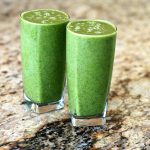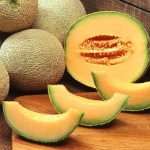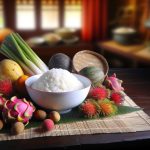Pumpkin is the darling of festive fall foods. It is the mainstay of Halloween decorations, the essential ingredient for making any pumpkin-based food such as pie and bread, and the distinct taste responsible for the immense popularity of the pumpkin spice latte.
Don’t restrict ourselves to one type of food – pumpkin is perfect in every dish, regardless of being spiced sweet or savory, like salads, coffees, mixed drinks, and even boiled dishes. It’s a delicious, versatile, and affordable ingredient.
Pumpkin is nutrient-rich and is an excellent source of antioxidants, Vitamin C, fiber, potassium, and other beneficial components, making it an excellent option to include in any meal.
Nutritional Values For Pumpkin
Pumpkins are not only a symbol of fall but also a nutritional powerhouse. They offer a variety of essential nutrients that can benefit your health. Here’s a breakdown of the nutritional values for pumpkin:
Low in Calories: Pumpkin is relatively low in calories, making it a great addition to a calorie-conscious diet. One cup of cooked, mashed pumpkin contains approximately 49 calories.
Rich in Fiber: Pumpkin is an excellent source of dietary fiber, which aids in digestion, helps maintain a feeling of fullness, and supports heart health. One cup of cooked pumpkin provides around 2.7 grams of fiber.
Vitamins:
- Vitamin A: Pumpkin is renowned for its high vitamin A content, with a single cup delivering over 200% of the recommended daily intake. Vitamin A is essential for healthy vision, a strong immune system, and skin health.
- Vitamin C: This vitamin is important for immune system support and skin health. One cup of pumpkin contains around 11 mg of vitamin C.
Minerals:
- Potassium: Pumpkin is a good source of potassium, which helps regulate blood pressure and maintain proper muscle and nerve function. A cup of cooked pumpkin provides roughly 564 mg of potassium.
- Iron: Pumpkin contains iron, albeit in smaller amounts. Iron is crucial for oxygen transport in the body.
Antioxidants: Pumpkin contains various antioxidants, such as beta-carotene, which can help protect your cells from damage caused by free radicals.
Low in Fat: Pumpkin is naturally low in fat, with less than 0.5 grams of fat per cup.
Protein: While not a significant source of protein, pumpkin does contain small amounts (about 1.2 grams per cup).
Carbohydrates: Pumpkin is a good source of carbohydrates, providing around 12 grams per cup. However, it has a relatively low glycemic index, which means it doesn’t cause rapid spikes in blood sugar levels.
Seeds: Pumpkin seeds, or pepitas, are also nutritious and packed with protein, healthy fats, and minerals like magnesium and zinc.
Incorporating pumpkin into your diet can be a flavorful and nutritious choice. You can enjoy it in various ways, from roasted pumpkin slices and pumpkin soups to adding canned pumpkin puree to smoothies or baked goods. Its versatility and rich nutrient profile make it a valuable addition to a balanced diet.
Health Benefits Of Pumpkin
Pumpkin offers a range of health benefits due to its impressive nutritional profile. Here are some of the key health benefits of incorporating pumpkin into your diet:
- Rich in Antioxidants: Pumpkin is loaded with antioxidants, including beta-carotene, which gives it its vibrant orange color. Antioxidants help protect your cells from damage caused by free radicals, reducing the risk of chronic diseases and promoting overall health.
- Supports Eye Health: Thanks to its high vitamin A content, pumpkin is excellent for eye health. Vitamin A is essential for good vision, particularly in low-light conditions, and it can help prevent age-related eye conditions like macular degeneration.
- Boosts Immune Function: The combination of vitamins A and C in pumpkin can strengthen your immune system. A robust immune system helps your body defend against infections and illnesses.
- Aids in Weight Management: Pumpkin is low in calories and high in fiber, making it a filling and satisfying food. The fiber helps control hunger and can assist in weight management by promoting a feeling of fullness.
- Heart Health: Potassium, found in abundance in pumpkin, plays a crucial role in maintaining healthy blood pressure levels and reducing the risk of stroke and heart disease.
- Digestive Health: The fiber content in pumpkin supports digestive health by promoting regular bowel movements and preventing constipation.
- Skin Benefits: The vitamins and antioxidants in pumpkin can contribute to healthy, glowing skin. Some people even use pumpkin-based skincare products to improve skin texture and appearance.
- Hydration: Pumpkin has a high water content, which can help keep you hydrated, especially when used in soups or stews.
- Bone Health: Pumpkin contains small amounts of minerals like calcium and magnesium, which are essential for maintaining strong bones and preventing conditions like osteoporosis.
- Reduces Inflammation: Some compounds in pumpkin, such as beta-carotene and other antioxidants, may help reduce inflammation in the body, potentially benefiting conditions like arthritis.
- Healthy Pregnancy: The folate content in pumpkin is important for pregnant women as it supports fetal development and reduces the risk of neural tube defects.
- Low in Fat: Pumpkin is naturally low in fat, making it a healthy choice for those looking to reduce their fat intake.
Remember that the health benefits of pumpkin are best realized when it’s part of a balanced diet. Incorporate pumpkin into your meals and snacks in various forms, such as roasted, pureed, or added to smoothies, to reap its nutritious rewards while enjoying its delicious flavor.
Fun ways to add pumpkin to your diet!
Adding pumpkin to your diet can be both delicious and fun, especially during the fall season. Here are some creative and enjoyable ways to incorporate pumpkin into your meals and snacks:
Pumpkin Smoothie:
Blend canned pumpkin puree with yogurt, a ripe banana, a dash of cinnamon, nutmeg, and a drizzle of honey for a creamy and nutritious pumpkin smoothie.
Pumpkin Pancakes:
Add pumpkin puree and a hint of pumpkin spice to your pancake batter for a seasonal twist on a breakfast classic. Top with maple syrup or yogurt.
Pumpkin Oatmeal:
Stir pumpkin puree into your morning oatmeal along with a sprinkle of cinnamon and chopped nuts for a warm and comforting breakfast.
Pumpkin Soup:
Whip up a creamy pumpkin soup by blending cooked pumpkin with vegetable broth, garlic, onions, and a touch of cream. Season with herbs like thyme or sage.
Pumpkin Pasta Sauce:
Mix pumpkin puree into your favorite pasta sauce for a velvety texture and a hint of sweetness. It pairs wonderfully with pasta, especially butternut squash ravioli.
Pumpkin Chili:
Add pumpkin chunks to your chili for extra texture and flavor. The natural sweetness of pumpkin complements the spicy and savory elements of chili.
Pumpkin Hummus:
Blend pumpkin puree into your homemade hummus for a unique twist. It’s great as a dip for veggies or pita bread.
Pumpkin Seeds Snack:
Roast pumpkin seeds (pepitas) with a sprinkle of sea salt and your favorite spices for a crunchy and nutritious snack.
Pumpkin Energy Balls:
Combine pumpkin puree, oats, almond butter, honey, and a mix of nuts and seeds to make energy balls. Roll them in shredded coconut or cocoa powder for extra flavor.
Pumpkin Spice Latte:
Make your own pumpkin spice latte at home by adding a spoonful of pumpkin puree and a dash of pumpkin spice to your coffee or latte. Top with whipped cream and a sprinkle of cinnamon.
Pumpkin Ice Cream:
Create a healthier version of pumpkin ice cream by blending frozen banana chunks with a bit of pumpkin puree and pumpkin spice. It’s a guilt-free dessert.
Pumpkin Seeds Salad Topper:
Toasted pumpkin seeds make a crunchy and nutritious topping for salads, adding a delightful contrast of texture.
Pumpkin Quesadillas:
Spread pumpkin puree on a tortilla, add cheese, and fold it in half to make a tasty and unique quesadilla.
Pumpkin Spice Latte Overnight Oats:
Mix rolled oats, pumpkin puree, almond milk, maple syrup, and a pinch of pumpkin spice. Refrigerate it overnight for a quick and satisfying breakfast.
Pumpkin Stuffed Peppers:
Hollow out bell peppers and stuff them with a mixture of cooked quinoa, ground turkey, black beans, and pumpkin puree. Bake until tender.
These fun and inventive ways to include pumpkin in your meals can add a seasonal flair to your diet while providing you with the nutritional benefits of this versatile vegetable. Enjoy!
READ MORE: Summer And Winter Squash









